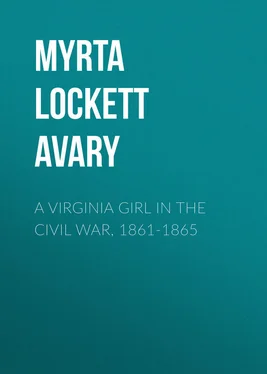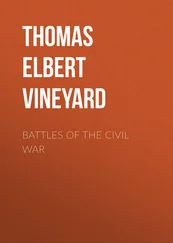Myrta Avary - A Virginia Girl in the Civil War, 1861-1865
Здесь есть возможность читать онлайн «Myrta Avary - A Virginia Girl in the Civil War, 1861-1865» — ознакомительный отрывок электронной книги совершенно бесплатно, а после прочтения отрывка купить полную версию. В некоторых случаях можно слушать аудио, скачать через торрент в формате fb2 и присутствует краткое содержание. Жанр: foreign_antique, foreign_prose, на английском языке. Описание произведения, (предисловие) а так же отзывы посетителей доступны на портале библиотеки ЛибКат.
- Название:A Virginia Girl in the Civil War, 1861-1865
- Автор:
- Жанр:
- Год:неизвестен
- ISBN:нет данных
- Рейтинг книги:5 / 5. Голосов: 1
-
Избранное:Добавить в избранное
- Отзывы:
-
Ваша оценка:
- 100
- 1
- 2
- 3
- 4
- 5
A Virginia Girl in the Civil War, 1861-1865: краткое содержание, описание и аннотация
Предлагаем к чтению аннотацию, описание, краткое содержание или предисловие (зависит от того, что написал сам автор книги «A Virginia Girl in the Civil War, 1861-1865»). Если вы не нашли необходимую информацию о книге — напишите в комментариях, мы постараемся отыскать её.
A Virginia Girl in the Civil War, 1861-1865 — читать онлайн ознакомительный отрывок
Ниже представлен текст книги, разбитый по страницам. Система сохранения места последней прочитанной страницы, позволяет с удобством читать онлайн бесплатно книгу «A Virginia Girl in the Civil War, 1861-1865», без необходимости каждый раз заново искать на чём Вы остановились. Поставьте закладку, и сможете в любой момент перейти на страницу, на которой закончили чтение.
Интервал:
Закладка:
I shall never forget the day my Prussian friends sailed away. From the roof of our residence over the bank, there was a good view of the harbor and river: Milicent, Emily Conway, and a number of girls who wanted to see the last of the gallant, handsome Prussians went up on the roof, and I was permitted to go with them. We turned our spy-glasses on their ships as they sailed toward Hampton Roads, and there were our friends on deck, their glasses turned upon the housetop where we stood in the full glare of the midday sun. Even I was visible to them. Milicent placed me in front of our spy-glass, and I looked through and singled out Baron von Golz, to whom I waved my handkerchief vigorously. A little snow-storm fluttered on the deck, and the baron not only waved, but saluted. According to the fashion of the time, young ladies wore low-necked dresses in the middle of the day – never, however, at any hour, so low as ladies at the opera wear them now. Milicent and her friends who went to the housetop were bare-necked, and the sun blistered their throats and shoulders; and mother had to bathe Milicent with buttermilk all the afternoon to make her presentable for the dance that night, which, by special permission, Count von Monts attended, coming up from Fortress Monroe to escort Milicent. They made a pretty picture when they danced their last dance together. The Count would not permit their friendship to cease with that last dance, and a correspondence was long kept up between them. At parting, she gave him her little Catholic prayer-book with her name on the fly-leaf, and years after, when revisiting Norfolk, he had that prayer-book and tried to find her; but times were changed, and Norfolk no more our home. Many a titled sailor sought my sister’s favor, but in our day Virginia’s daughters, undazzled by coronets, were content to wed Virginia’s sons.
The almost limitless hospitality of those days made all the sharper the distinction between “open house” and open hand. In the forties, the reserve of the American girl was more like that of her English sister than it is at the present day. Society did not sanction the freedom which it countenances now. The gentlewoman of the old South was a past mistress in the art of tact, but had little knowledge or practise in it to further her own private ends. Its office, as she understood it, was to relieve painful situations not her own, to contribute to the comfort and pleasure of others. To rid herself of a disagreeable third person to secure a tête-à-tête with a lover was not within its province. Lovers had to make their own opportunities – indeed it was not her part even to conceive that they wanted to make opportunities. Taking all this into consideration, the freedom with which Southern children entered into the social life must have often made them thorns in the flesh of their elders. I have often wondered since those happy days if my favorites among my sister’s visitors did not find me a great nuisance in spite of the caresses they lavished upon me.
The New Year’s reception of that period was not an afternoon and evening affair. It began in the morning and lasted all day; it meant pretty girls fluttering in laces and ribbons and feathers and sparkling with jewels and smiles; stately matrons who, however beautiful and young they were, never indulged even in the innocent coquetry that neither deceives a man nor wounds a woman – the married belle was unknown to Virginia; and gallant men, young and old, ready to die for them or live for them; it meant the good things to eat for which Virginia is famous, and, I am sorry to say, often more than enough of good things to drink. I remember one of these New Year’s days when the ardor of my affections prevented a young officer who had come to bid us good-by from exchanging a word with anybody unhampered by my close attendance. I was brimful of nine-year-old love for him. I proposed to him and was promptly accepted; I made him drink punch with me dipped from the old punch-bowl that had been presented to father by the military companies of Norfolk, and I told him how Admiral Tucker had made the presentation with flags flying and bands playing and wine flowing, and how the admiral tried to ride his horse up the front steps into the house, and how the sober animal wisely and firmly refused to perform the feat. Through a long day he did not once escape me. This young officer was Lieutenant John L. Worden. He was one of the gallant “boys in blue” who made my sister’s girlhood happy. A most charming gentleman he was, and everybody in my father’s house loved him.
Another young sailor – the handsomest of them all, whom everybody in my father’s house loved – was Captain Warren. How well I remember that evening when the order came bidding him report at once to his ship, which was to set forth on a long cruise in Eastern waters! Shall I ever forget the look in his eyes as he turned them upon Milicent! How beautiful she was that night! How gracious and sweet, how greatly to be desired! And how many desired her!
Milicent had been married several years and I was in the raptures of my first winter in society when my father died, and mother decided that we should leave Norfolk – Norfolk where river and bay and ocean had sung our cradle-songs – and go to Petersburg to live. In this day of independent women it sounds absurd to say that it was scarcely considered wise or delicate for women to live without the protection of a male relative in the house, and to add that as far as possible they were shielded from the burden of business responsibilities. Uncle Henry considered it imperative that we should be under his care; he could not come to Norfolk, so we went to him. We could scarcely have been strangers anywhere in Virginia, and in Petersburg we had many friends. The Lees and the Randolphs, the Pegrams and the Pages, the Stringfellows, the Hamiltons, the Witherspoons, the Bannisters, the Donnans, the Dunlops, and a score of others made it easy to exercise the genius for friendship which in Virginia hands down that relation from generation to generation.
It was in Petersburg that my trousseau was made. Much of it was the work and embroidery of loving, light-hearted girls whose feet were set to music and dancing, and most of it was worn by women who trod instead fields red with the blood of their friends and kinsmen. During the long, dreary years in which the Northern ports were closed, and the South clothed itself as best it could, or went in rags, that trousseau constituted my sole outfit, and it reinforced the wardrobes of some comrades in war and want.
CHAPTER II
HOW I MET DAN GREY
“Have you met Dan Grey?”
Charlie Murray and I were galloping along a country road.
“I haven’t, Charlie. I met his brother Dick in Norfolk, and didn’t like him at all.”
“Well, Nell, you’d like Dan – everybody does. I wonder you haven’t met him. Dan never fails to meet every pretty girl that comes here.”
I had heard that before. Indeed, I had heard a great deal about Dan Grey that made me long to get even with him. Everybody had a way of speaking as if Petersburg wasn’t Petersburg with Dan Grey left out.
“You ought to meet Dan Grey,” Charlie repeated.
“I don’t think so,” I rapped out. “I think I can get along very nicely without meeting Dan Grey” – Dan Grey seemed to be getting along very nicely without meeting me – “I know as many nice men now as I have time to see.”
So I dismissed Dan, whipped up my horse, and raced Charlie along the old Jerusalem Plank Road – that historic thoroughfare by which the Union troops first threatened Petersburg, and near which Fort Hell and Fort Damnation are still visible. We ran our horses past the old brick church, built of bricks brought from England to erect a place of worship for the aristocratic colonists, past the quiet graves in Blandford; and turning our horses into Washington Street, slackened their pace and, chatting merrily the while, rode slowly into the city toward the golden sunset. A few years later I was to run along this street in abject terror from bursting shells.
Читать дальшеИнтервал:
Закладка:
Похожие книги на «A Virginia Girl in the Civil War, 1861-1865»
Представляем Вашему вниманию похожие книги на «A Virginia Girl in the Civil War, 1861-1865» списком для выбора. Мы отобрали схожую по названию и смыслу литературу в надежде предоставить читателям больше вариантов отыскать новые, интересные, ещё непрочитанные произведения.
Обсуждение, отзывы о книге «A Virginia Girl in the Civil War, 1861-1865» и просто собственные мнения читателей. Оставьте ваши комментарии, напишите, что Вы думаете о произведении, его смысле или главных героях. Укажите что конкретно понравилось, а что нет, и почему Вы так считаете.












